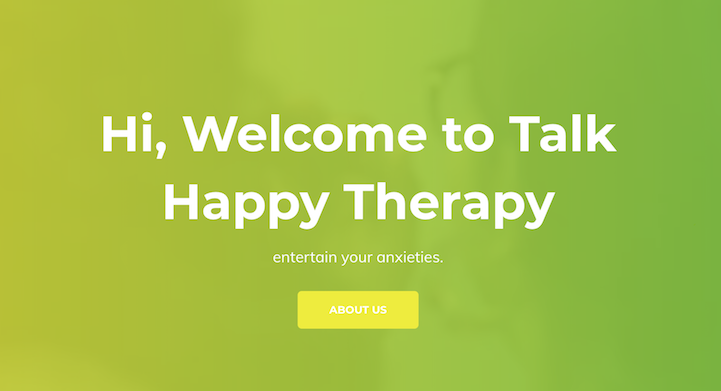Preventive Mental Health
By Devanik Saha
Talk Happy Therapy recently did a workshop at TERI School of Advanced Studies in Delhi. I spoke to Simran Luthra, the founder of Talk Happy Therapy for The Health Collective to find out more about her attempts to use “fun methods” to revolutionise the mental health sector in India. Edited excerpts of conversation and a psychologist’s take below.
1. Can you tell us about Talk Happy Therapy? What led you to start this initiative?
We officially launched TalkHappy Therapy on 20th March 2017. The idea was to revolutionise the traditional methods of mental health services to sessions involving expressions of happiness. We aim to do this by dealing with three core issues facing the mental health sector in India: Availability, Accessibility and Affordability. Our team consists of 10 people (five in Delhi, five in Bangalore), with four of them being psychology graduates…We have three advisors who are senior psychologists/mental health consultants, who advise and provide support from time to time. However, we mostly work on preventive issues. We do not take up mental disorders. We do counsel people if they need us, however, we do not diagnose them. If there is a serious need, we counsel and refer them to an appropriate psychologist/psychiatrist.
ALSO READ: IS INDIA READY TO TACKLE A MENTAL HEALTH CRISIS
2. What exactly is Talk Happy Therapy’s methodology for talking about mental health and why did you choose this? Could you describe some of the fun methods for our readers?
Our approach includes creative methods such as poetry, storytelling, and stand-up comedy to talk about mental health. We want to shift the approach of just being serious to talking about mental health in a fun manner. Till now, we have done around 15 workshops in Delhi and Bangalore in institutions such as TERI School of Advanced Studies, Banasthali Vidyapeeth, Artemis Hospital, etc. which have covered around 1000-1200 people. We generally cater to people aged between 18 years to 27-28 years. Mostly, these people are in a low sad state and not in the best of their minds. Here is an example of using English poetry to talk about mental health.
3. Why has Talk Happy Therapy specifically chosen this approach? What are the challenges of normal therapy/counselling?
For me, the traditional method of counselling/therapy involves a dark dull room with two people sitting in one room with one person listening and one venting out. I believe this is too serious an approach. People often feel suffocated. I have taken therapy and that was suffocating for me. Furthermore, in case of psychiatrists who are 40-50 years old, I feel there is an empathy problem from their side. Mentally, we are a new generation and thus, the healing methods need to be tweaked according to our needs and characteristics. We should revolutionise the way we look at therapy. These are the problems I faced during my therapy and that motivated me to start TalkHappy Therapy. I feel the ‘fun’ method is important because mental health is always seen in light of seriousness and stigma. As a youth today, its important to change the perspective we carry around mental health. Fun is an element which attracts a huge mass population and thus, I feel that it can help in bringing a change.
ALSO READ: IS THERAPY FOR EVERYONE?
(EDITOR’S NOTE: Views Expressed are Personal. If you suffer from a mental illness or mental disorder, or are worried about your own mental health, do consult with your own therapist before making any decisions on your treatment.)
Here is a Psychologist’s Reaction:
“In mental health, I strongly believe that there should not be any one universal method. Everyone has their own needs and demands. It is totally ok if a person feels suffocated within a room sitting with another person and venting out. These days, there are many support groups, where people meet and talk together about each other’s problems. If a person is not comfortable with meeting a counsellor individually, they can choose an alternative path. However, it must be noted these other methods are great for breaking the stigma and working according to the comfort level of a person to take care of their mental health. But when it comes to experiences of depression, anxiety and other clinical disorders, visiting a professional is always helpful. These other methods can be a beautiful supplement to that, rather than a complete replacement.”
— Shweta Srinivasan, a psychologist based in Mumbai to The Health Collective.
4. What are the different ways you talk to/counsel people? How much do you charge for your services?
We conduct workshops, provide individual counselling and psychological first-aid in emergency situations. We do two kinds of workshops:
Public workshops: For free in partnership with media and entertainment organisations; Organisation-specific workshops where we charge Rs 5,000 to Rs 10,000 per workshop. We have provided individual counselling to more than 100 people for which we charge Rs 149/hour and digital counselling (through Facebook is free).
5. Any specific example of person you have (worked with) individually?
There was an acquaintance who called me up and started crying. I was shocked because he never cried in front of me. He told me that he is waiting for a train to come and wants to commit suicide. As soon as I heard it, I focused on providing psychological first-aid to him. First, I tried consoling him and slowly by talking for 45-50 mins, distracted his thoughts to move him away from the situation. After a while, he returned home and I referred him to a psychologist who took care thereafter. Interestingly, he was already consulting a psychologist but he chose to call me and not the person.
REACH OUT FOR HELP: HELPLINES
Views expressed are personal. The Health Collective cannot substitute for expert advice from a trained professional.
Feature image via Talk Happy Therapy site
This story was amended to correct where the workshop was held.



